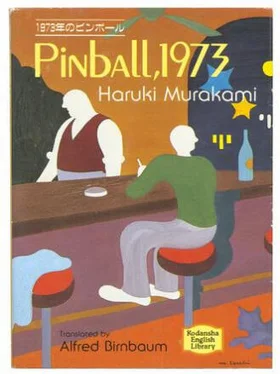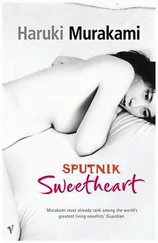Haruki Murakami - Pinball, 1973
Здесь есть возможность читать онлайн «Haruki Murakami - Pinball, 1973» весь текст электронной книги совершенно бесплатно (целиком полную версию без сокращений). В некоторых случаях можно слушать аудио, скачать через торрент в формате fb2 и присутствует краткое содержание. Издательство: Unknown publisher, Жанр: Современная проза, на английском языке. Описание произведения, (предисловие) а так же отзывы посетителей доступны на портале библиотеки ЛибКат.
- Название:Pinball, 1973
- Автор:
- Издательство:Unknown publisher
- Жанр:
- Год:неизвестен
- ISBN:нет данных
- Рейтинг книги:3 / 5. Голосов: 1
-
Избранное:Добавить в избранное
- Отзывы:
-
Ваша оценка:
- 60
- 1
- 2
- 3
- 4
- 5
Pinball, 1973: краткое содержание, описание и аннотация
Предлагаем к чтению аннотацию, описание, краткое содержание или предисловие (зависит от того, что написал сам автор книги «Pinball, 1973»). Если вы не нашли необходимую информацию о книге — напишите в комментариях, мы постараемся отыскать её.
Pinball, 1973 — читать онлайн бесплатно полную книгу (весь текст) целиком
Ниже представлен текст книги, разбитый по страницам. Система сохранения места последней прочитанной страницы, позволяет с удобством читать онлайн бесплатно книгу «Pinball, 1973», без необходимости каждый раз заново искать на чём Вы остановились. Поставьте закладку, и сможете в любой момент перейти на страницу, на которой закончили чтение.
Интервал:
Закладка:
I nodded silently.
"Why don't you get some sleep?" said the other.
And so I slept.
* * *
So far, I have been telling this story as my very own, but it is also the story of another guy, whom we'll call the Rat. That autumn, the two of us – he and I – were living nearly five hundred miles apart.
September 1973, that's where this novel begins. That's the entrance. We'll just hope there's an exit. If there isn't one, there wouldn't be any point in writing anything.
ON THE ORIGINS OF PINBALL
First of all, we'll need to know the name of one Raymond Maloney. It seems that there used to be someone by that name, but he has since died. That's about all there is to know about his life. Which is to say that nobody knows him from nothing. Not any more than they know a water spider at the bottom of a well.
To be sure, it's a historical fact that by this man's very hands the first prototype of the pinball machine was brought unto this realm of defilement in 1934 from out of the great, golden cloud of technology. Which is again the very year that, across that giant puddle called the Atlantic, one Adolf Hitler was getting his hands on the first rung of the Weimar ladder.
Raymond Maloney's life story has none of the mythic color of the Wright Brothers or Alexander Graham Bell. No heartwarming episodes of youth, nor any dramatic "Eureka!" Only scant mention of his name on page one of a strange tome written for a scant handful of curious readers. A reference which may be summed up: in 1934, Raymond Maloney invented the first pinball machine. Not even a photograph with it. Needless to say, we find neither portrait nor statue to his memory.
Now you're probably thinking, had this Maloney never existed, the history of the pinball machine would have been entirely different from what it is today. Or worse, it might well not have come into existence at all. And hence, might not our hasty underestimation of this Maloney amount to the height of ingratitude? Yet if we had occasion to personally examine that very first prototype "Ballyhoo" created by Maloney's own hands, all such thoughts would surely vanish. For there we'd find not one single element to stir our imagination.
The progress of the pinball machine and of Hitler exhibit certain similarities. Both have dubious beginnings, coming on the scene as mere bubbles on the froth of the times; it is through their evolutionary speed rather than any physical stature per se that they acquire their mythic aura. And of course, that evolution came riding in on three wheels: to wit, technology, capital investment, and last but not least, people's basic desires.
With devastating speed people kept providing the singularly undistinguished protean machine with ever-newer capabilities. Someone proclaimed, "Let there be lights!" Someone else shouted, "Let there be electricity!" Still another shouted, "Let there be flippers!" And so there came to be lights illuminating the field, electricity to deflect balls magnetically, two flipper arms to whip them back into play.
Scoring came to numerically convert players' proficiency by a factor of ten, while tilt lamps guarded against rough handling and rocking of the machine. Next came the metaphysical concept of sequencing, which led to such variations as the Bonus Light, Extra Ball, and Replay schools. Actually by this time, pinball machines had come to possess a magical fascination.
* * *
This is a novel about pinball.
* * *
The introduction to Bonus Light , that exegesis of pinball, has this to say:
There is precious little you can gain from a pinball machine. Only some lights that convert to a score count. On the other hand, there is a great deal to lose. All the coppers you'd ever need to erect statues of every president in history (provided, of course, you thought well enough to erect a statue of Richard M. Nixon), not to mention a lot of valuable and nonreturnable time.
While you're playing yourself out in lonesome dissipation in front of a pinball machine, someone else might be reading through Proust. Still another might be engaged in heavy petting with a girlfriend at a drive-in theater showing of Paths of Courage . The one could well become a writer, witness to the age; the others, a happily married couple.
Pinball machines, however, won't lead you anywhere. Just the replay light. Replay, replay, replay .... So persistently you'd swear a game of pinball aspired to perpetuity.
We ourselves will never know much of perpetuity. But we can get a faint inkling of what it's like.
The object of pinball lies not in self-expression, but in self-revolt. Not in the expansion of the ego, but in its compression. Not in extractive analysis, but in inclusive subsumption.
So if it's self-expression or ego-expansion or analysis you're after, you'll only be subjected to the merciless retaliation of the tilt lamps.
Have a nice game.
1
No doubt there are numerous ways to tell twin sisters apart, but I only knew of one. Not only were they alike in every respect, right down to their expressions, voices, and hair styles, but they didn't even have the slightest distinguishing beauty mark or blemish. I was at a total loss. They were perfect copies. Their reactions to any given stimulus were identical; the things they ate and drank, the songs they sang, the hours they slept, even their periods – everything was the same.
The whole situation was beyond me; my imagination couldn't cope with what it must be like to be a twin. I mean, I'm sure that if I had a twin brother, and we were alike in every detail, I'd be really mixed up. Because I'm mixed up enough as it is.
Still, all things being equal, the two girls went about their affairs with the utmost equanimity. As a matter of fact, the girls were shocked when they found out I couldn't tell them apart. They were understandably furious.
"Why, we're completely different!"
"Total opposites!"
Which shut me up. So I just shrugged.
I can't even begin to guess how much time has gone by since they moved into my apartment. The only thing I know for certain is that ever since they'd begun living with me, my internal clock has been running perceptibly behind. It occurs to me that this must be how organisms that multiply by cell-division experience time.
* * *
A friend of mine and I leased a condominium on the slope from Shibuya to Nampeidai and opened a small translation service. My friend's father put up the funds, which is not to say that it took any astounding sum of money – just the deposit on the place, and the money for three steel desks, some ten dictionaries, a telephone, and a half-dozen bottles of bourbon. We thought up a suitable name, and with the rest of the money had it engraved on a metal sign and hung it out front, then put an ad in the newspaper. After that we waited for customers. The two of us, with our four feet propped up on the desks, drinking whiskey. It was the spring of '72.
After a few months, we felt we'd struck a real gold mine. An amazing amount of business found its way to our humble office. And with our earnings we bought an air conditioner, a refrigerator, and a home bar set.
"We've made it, we're a success!" my friend exclaimed.
It made me all warm inside. Because it was the first time in my life that I had heard such encouraging words.
We even got a rebate from a printer contact my friend had, whom we'd let handle all the translations that needed printing. I'd gotten a university that taught foreign languages to pool some of their better students, and farmed out to them any unmanageable volume of work for rough translation. We hired an office girl to take care of the accounts, odd chores, and messages. A bright, attentive girl fresh out of business school, with long legs and no particular shortcomings, save that (in dull moments) she would hum "Penny Lane" up to twenty times a day. "We sure did right by getting her," my friend pronounced. So we paid her one hundred fifty percent of the normal company salary, gave her a five-month bonus, and granted ten days' leave in the summer and winter. So each of us had every reason to be happy, and we got along famously.
Читать дальшеИнтервал:
Закладка:
Похожие книги на «Pinball, 1973»
Представляем Вашему вниманию похожие книги на «Pinball, 1973» списком для выбора. Мы отобрали схожую по названию и смыслу литературу в надежде предоставить читателям больше вариантов отыскать новые, интересные, ещё непрочитанные произведения.
Обсуждение, отзывы о книге «Pinball, 1973» и просто собственные мнения читателей. Оставьте ваши комментарии, напишите, что Вы думаете о произведении, его смысле или главных героях. Укажите что конкретно понравилось, а что нет, и почему Вы так считаете.












